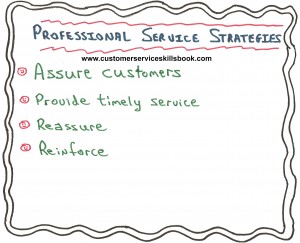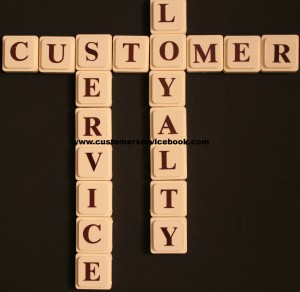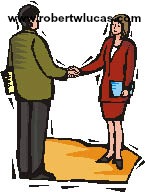Recovering from Customer Service Breakdowns
Customers are better educated and have access to a more competitive product and service information that at any time in history. The result is that when they contact a customer service representative, they have specific wants, needs, and expectations. When their preconceived ideas are not met, service breakdowns are likely to occur.
The following are three common situations that can lead to customer dissatisfaction and potentially cause defection to a competitor when customer service representatives fail to create positive customer experiences. Strategies for preventing customer service breakdowns are also provided.

Service breakdowns often occur when customer service representatives:
Are preoccupied when customers call or are present. If you have ever called or visited an organization only to have them put you on extended hold, disconnected you, or failed to acknowledge your presence and serve you right away while they performed some task, you know how your customers might feel under similar circumstances.
If you are a service provider and must put someone on hold while on the phone, do so only if you are currently serving another customer or you have no other option. If you must put them on hold, ensure that you explain why they are being asked to wait and how long it will take to get to them. Remember that effective telephone etiquette is crucial for service success.
When providing face-to-face service and a customer arrives while you are performing an administrative function, such as filing, calculating, writing, stocking, completing a task, or other such function, quickly get to a point where you can pause and serve the customer. In the meantime, take a moment to make eye contact, smile and either tell them or non-verbally (by holding up a single index finger) that you will be with them as soon as possible. Effective nonverbal communication such as this is especially important when dealing with someone from a culture in which relationships are an important aspect of business (e.g. the Middle East, Hispanic cultures, and Asia). Your efforts may not satisfy everyone, but they work with most customers who understand that many service providers are doing more with fewer human assets these days.
Project an uncaring attitude. You may experience instances when customer service or communication is strained when dealing with a customer. This can occur if they perceive that the products or services they received did not meet their needs or expectations or were not delivered as promised. An uncaring perception can also be projected if you are not focused on delivering quality global customer service and through your actions, words or non-verbal cues send messages that the customer is not a priority.
To avoid the potential perception that you are uncaring, strive to make sure that you are always prepared for customers. Put other tasks aside, clear your head of previous issues or events and focus on your current customer and their needs or issues. Also, listen to and show interest in what your customers have to say.
Fail to assume responsibility. A big complaint that many customers have, especially when dealing with web-based businesses, is that they cannot find a “real person” to talk to when they have a question or a problem arises.
Many organizations intentionally make finding their contact information (if they even list it on their website) difficult to locate because they do not want people calling their representatives. They do this under the guise of making service delivery more efficient for customers through the technology they offer. When customers do finally locate the contact information, they often encounter an automated attendant system that requires numerous choice selections and often ends with a message saying something like, “You are important to use. All of our agents are currently helping other customers; your estimated wait time is ___.”
To prevent being part of problem situations, continually look for ways to make yourself accessible to your customers. Also, make recommendations to your supervisor for improvement to your system whenever you identify a glitch. Whether you are interacting with customers in person or via technology and a service breakdown occurs make sure that you apologize, when appropriate, assume responsibility for delays or service breakdowns and offer to assist professionally.
Possible strategies for preventing service breakdowns include avoiding fault deference to technology, your organizational system or other people. For example, avoid using statements like:
“I am unable to do (whatever the customer is requesting); they/our policy won’t let us…” or “Our system is down right now; can you call back later?”
Instead, work toward positive and immediate service recovery by telling your customer what you can do; not what you cannot. For example, “I apologize for the inconvenience you have experienced with _______ Mr./Ms. _____. While we cannot do _____, what I can do in this instance is to ____.” or “My sincere apologies for the inconvenience Mr./Ms/ _____, however, I cannot get that information at the moment because our computer system is down. Can I take your phone number or email address and get that information for you as soon as it comes back up?”
Ultimately, be a problem solver and resource by taking responsibility and working to assist your customers; not an obstacle to good service and satisfaction.
In order to prevent service breakdowns from occurring, take time to review your current policies, procedures and service environment to ensure that they are ready address the needs and expectations of your customers.
For additional ideas on strategies for preventing and addressing service breakdowns, check our two books by Robert W. Lucas – Customer Service: Skills for Success and Please Every Customer: Delivering Stellar Customer Service Across Cultures.
About Robert C. Lucas
Bob Lucas has been a trainer, presenter, customer service expert, and adult educator for over four decades. He has written hundreds of articles on training, writing, self-publishing, and workplace learning skills and issues. He is also an award-winning author who has written thirty-seven books on topics such as, writing, relationships, customer service, brain-based learning, and creative training strategies, interpersonal communication, diversity, and supervisory skills. Additionally, he has contributed articles, chapters, and activities to eighteen compilation books. Bob retired from the U.S. Marine Corps in 1991 after twenty-two years of active and reserve service.
Make Money Writing Books: Proven Profit Making Strategies for Authors by Robert W. Lucas at Amazon.com.
The key to successfully making money as an author and/or self-publisher is to brand yourself and your company and to make yourself and your book(s) a household name. Part of this is face-to-face interaction with people at trade shows, library events, book readings, book store signings, blogging or guest blogging on a topic related to their book(s). Another strategy involves writing articles and other materials that show up online and are found when people search for a given topic related to a topic about which the author has written.
If you need help building an author platform, branding yourself and your book(s) or generating recognition for what you do, Make Money Writing Books will help. Bob’s popular book addresses a multitude of ideas and strategies that you can use to help sell more books and create residual and passive income streams. The tips outlined in the book are focused to help authors but apply to virtually any professional trying to increase personal and product recognition and visibility.










